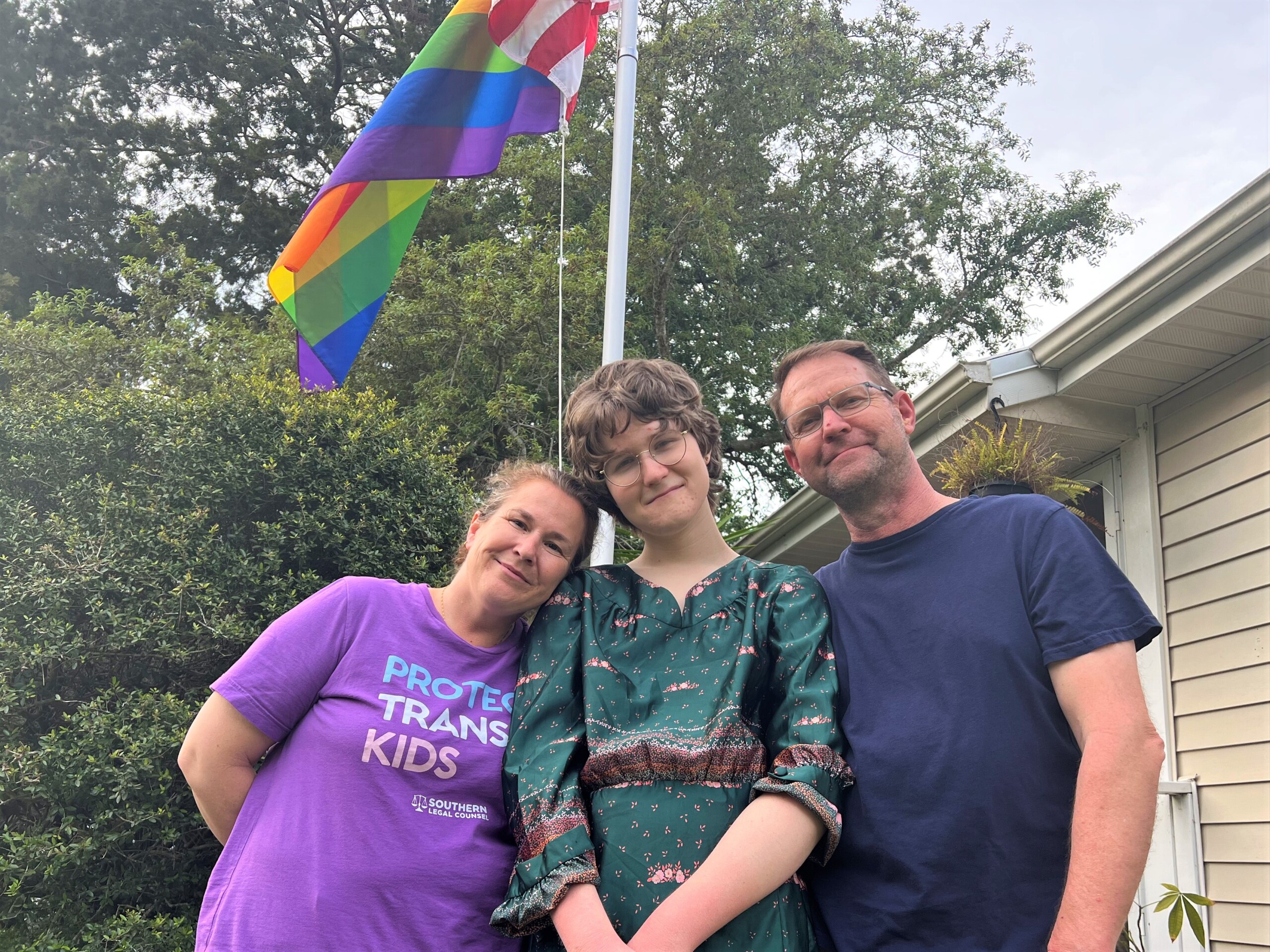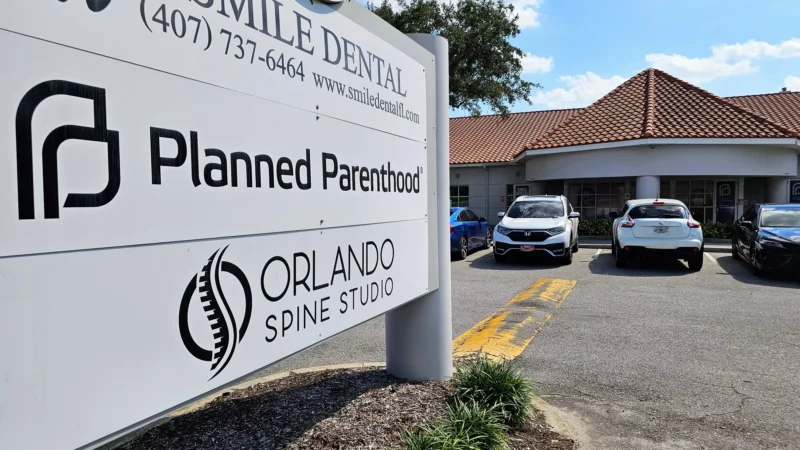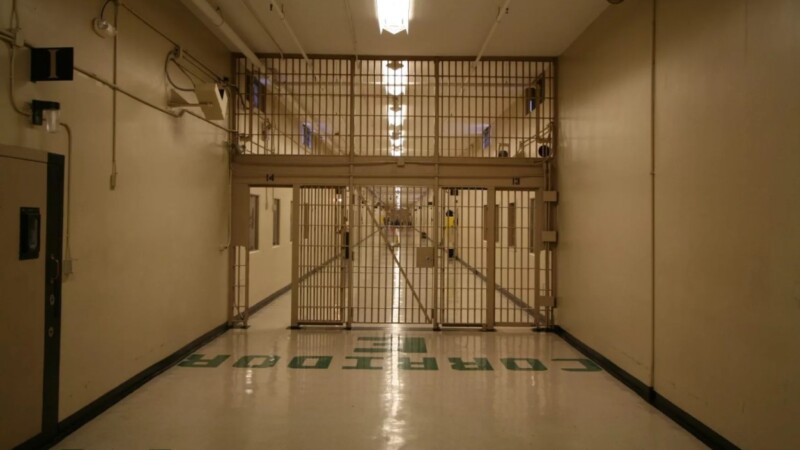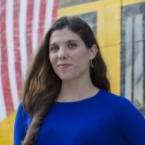Florida lawmakers voted on Wednesday to further limit access to gender-affirming care, while state education officials expanded restrictions on gender identity instruction in schools. It’s the latest in a string of efforts some families of transgender youth say are forcing them to flee the state.
One family recently made the painful choice to live more than 1,000 miles apart to protect their child’s wellbeing.
“It’s just unbelievable how far the state has fallen,” said Josie, 16, of St. Johns County. We’re not using her family’s last name to protect their privacy.
On a recent afternoon, Josie and her mom Sarah were prepping their home for a going away party. Sarah surprised her with a homemade decoration: a paper chain made with cut up strips of a map of New England. Josie enjoys traveling and learning about maps and history. She scanned the paper chain until she found a map of Providence, Rhode Island. She would be going there that weekend.
But this was no vacation.
Josie was moving from her home in St. Johns County — and from her parents — to live with her aunt and uncle and finish high school up there. She’s transgender and feels like she can’t live in Florida anymore.
“Because, just, unnecessary advancements by the legislature and the board of medicine … I would have expected better from people elected into office,” said Josie, referring to efforts to restrict access to health care she needs.
Josie takes puberty blockers and estrogen hormones to help her body align with her identity. It comes after years of counseling and working closely with doctors who follow guidelines set by organizations like the World Professional Association for Transgender Health and Endocrine Society. Most major medical associations agree gender-affirming care is safe and effective.
But Republican state leaders want to restrict access to the treatments, arguing they are “experimental.”
The moment she knew
For Josie, thoughts of a move started forming after Florida Surgeon General Joseph Ladapo asked state medical boards last spring to ban doctors from providing these treatments to trans youth. On an almost weekly basis, she would ask her mom Sarah what the chances were she would actually need to leave.
The odds started small, but increased as the Florida Boards of Medicine and Osteopathic Medicine got closer to issuing bans.
“I thought that they [board members] would realize what they’ve done wrong and you know repeal some things, but they just kept going. It just became, like, too real, too fast.”
Josie
Fast forward to Feb. 10, when the boards held what would be their last public hearing before finalizing rules, which went into effect in March. Trans residents and their allies who had spent months testifying about the benefits of gender-affirming care were outraged and challenged the rules in court.
Kids like Josie who had already started treatments were allowed to continue under the rules. But she feared her access wouldn’t be safe for long. She decided it was time to go.
“I thought that they [board members] would realize what they’ve done wrong and you know repeal some things, but they just kept going,” said Josie. “It just became, like, too real, too fast.”
Within weeks, state lawmakers began advancing bills to continue restricting gender-affirming care. The House passed a bill on Wednesday that would force kids exempt from the medical board ban like Josie to stop their treatments by the end of the year. The Senate had passed a similar bill but will now vote again on the amended version.
Other efforts would ban trans people from using bathrooms that don’t match their sex assigned at birth and prevent schools from using trans’ students pronouns.
Clinics like the University of Florida’s Youth Gender Program, where Josie gets her hormones, could also lose public funding.
Uncertainty about the future and barrage of negative news is hard on families, said Jennifer Evans, a clinical psychologist at the clinic.
“It’s absolutely taking a toll,” said Evans. “I’m seeing more anxiety, more depression. Things I hear patients say are, ‘The government doesn’t want me to exist;’ they don’t feel safe.”

“A mass migration”
It’s not just Florida. As of Thursday, the American Civil Liberties Union is tracking 467 bills the group considers anti-LGBTQ that state legislatures around the U.S. introduced this year. A few dozen have already been signed into law, more than previous years. Others won’t go anywhere.
But a bill doesn’t have to pass for it to cause harm, said Evans, who identifies as queer.
“It’s a lot to feel like enough people in this country don’t agree with your existence — which actually isn’t affecting them, aside from their politics or their personal ethics — that people want to shut down other people’s access to living full and complete and affirmed lives,” she said. “It’s really hard to understand, and it’s painful to see that.”
This month the advocacy group Equality Florida issued a travel advisory warning the LGBTQ community the state may not be a safe place to move or visit, citing gender-affirming care bans and education policies moving through the legislature as some examples of what the group considers risks.
“These are consequential pieces of legislation that have dire consequences on the people of Florida and potentially people visiting and that’s what precipitated us wanting to lay it all out for people so they just know before they make the decision about whether or not this is the right state to be in,” said press secretary Brandon Wolf.
Many other families who live here tell Evans they are plotting their exits as well.
“It makes me so sad to think of a state where all the trans people have left, like, there’s a mass migration because people don’t feel safe here anymore,” said Evans, who adds she is committed to staying and supporting the mental health needs of her patients.
“…Because the alternative isn’t going to be that people ‘de-transition,’” she said. People are who they are and what we know from mental health research is that the best thing for people to do is have their identities affirmed, and so people will pick up and go to states where they can have that experience if they’re able to.”
But moving isn’t easy.
Like many families, Josie’s parents had a lot to consider. They couldn’t afford to quit their jobs. Finding a place to live up north was another challenge. So they decided to stay behind for now.
It felt like an impossible decision, said Sarah.
“It was just terror in my heart, like you could just feel that cold burst in my chest just going all throughout my body, just a lot of shock” she said. “I couldn’t imagine what it would be like to wake up — like Josie’s part of everything I do.”
The thought of being separated from her parents — and her dog Reesie — was tough for Josie too. As she spoke, Reesie quietly crawled onto the couch and snuggled up to her.
“She has, like, a sense when I’m sad and then she just comes running in,” said Josie.
A “bombardment” of support
Josie had put off packing as long as she could but with just a few days to go before she moved, it was time.
As she and her mom went through her closet, they remembered the good times Josie had in school: formal dances, pool parties, etc.
But then are the bad memories.
Her school wouldn’t allow her to play on the girls’ tennis team due to a state law that bans trans girls from playing on school sports teams intended for students assigned female at birth.
Then last year the Parental Rights in Education Law, which critics call “Don’t Say Gay,” went into effect. It restricts instruction about gender identity and sexual orientation in schools.
Lawmakers who supported it said it was meant to apply to elementary schools, but it had a chilling effect. Josie watched as her school removed things like stickers on classrooms that signified they were “safe spaces” for LGBTQ youth, which other schools in Florida did as well.
This year state legislators advanced bills to expand the law to cover middle schools, but the DeSantis administration beat them to it. On Wednesday, the Florida Board of Education approved a rule that effectively expands the law to apply through high school.
Josie won’t have to experience whatever changes may come as a result, as she’ll be at her new school in Rhode Island.

When she toured it for the first time over spring break in March, she said her jaw dropped.
“I just felt like the environment was bombarding me with support,” said Josie.
“It was just like such a shock to me — like not a bad shock, but like, just shocked that this is how schools can be — it’s just that Florida is just choosing not to be like that.”
Josie
“Safe space” stickers and LGBTQ pride flags lined the halls, Josie said, and there were posters for what looked to her like a very active Gender and Sexuality Alliance club.
“It was just like such a shock to me — like not a bad shock, but like, just shocked that this is how schools can be — it’s just that Florida is just choosing not to be like that,” she said.
Health News Florida reached out to Gov. DeSantis’ office several times to respond to families’ concerns but has not heard back.
As painful as it is to have his daughter move under these circumstances, Josie’s dad Eric says he feels for the kids who can’t leave. He and Sarah say they will keep their pride flag waving in the yard and advocate for equality while Josie is away.
“I hope that the lawsuits work,” Eric said. “I think continued action and voicing opposition to the governor and the policies of the state will hopefully gain traction at some point. Just got to keep standing up and fighting for trans kids.”
Josie’s parents say they’re proud of her for taking this leap and hope she’ll be free to just be herself now.
At her going away party, Josie and a small group of friends played a dance video game on her Nintendo Switch. They laughed as they tried to mirror the characters on screen dancing to the hip hop song “Watch Me (Whip/Nae Nae” by Silentó.
Her paper chain made of maps draped around the living room. Sarah passed around slices of black forest cake, a favorite of Josie’s.
On the cake plate, “We love you Josie” was piped in frosting.
Josie says she’ll miss her parents’ hugs most of all.
Now in Rhode Island, Josie says she’s already met some new friends at school and plans to join the Gender and Sexuality Alliance. Her doctor at UF referred her to a health system in the area that provides hormone therapy. Her parents talk to her every day and plan to visit as often as they can.
It’s unclear what Florida will look like for trans kids when Josie returns for summer break, or if she’ll ever call the state home again. For now she’s moving on.
9(MDEwNzczMDA2MDEzNTg3ODA1MTAzZjYxNg004))







